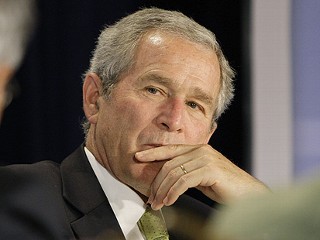Barack Obama maintains an advantage on the economy, especially economic empathy, and he's cracked majority acceptance on his key challenge, experience. But the political center remains unrooted, keeping John McCain in the race, albeit against headwinds.
Movement continues among independents, quintessential swing voters and a highly changeable group this year.
They favored McCain by 10 points immediately after the Republican convention, swung to Obama last week and stand now at a close division between the two -- 48 percent for McCain, 45 percent for Obama in the latest ABC News/Washington Post poll.
Click here for a PDF with charts and full questionnaire.
Preference among likely voters overall is 50-46 percent, Obama-McCain, a bit closer (albeit within sampling error) than the 52-43 percent last week.
The race between them is up for grabs as long as movables -- independents and others less rooted in partisan allegiance -- remain unswayed by either candidate.
But fundamental advantages for Obama remain.
McCain's laboring under the Bush legacy. With the current economic situation, a record 70 percent of Americans disapprove of George W. Bush's job performance; a career-low 26 percent approve.
Bush's Disapproval Rating Highest in History
Just two presidents have had lower approval (Richard Nixon and Harry Truman) than President Bush, and none has had higher disapproval in polls since 1938.
McCain's problem: Fifty-three percent of registered voters think he'd lead the country in the same direction as Bush, inching back up over a majority.
Forty-eight percent of registered voters are uncomfortable about McCain's age, a new high. And while Obama has advanced since mid-June in the sense that he's a "safe" choice for president, to 55 percent, McCain has lost ground on this measure; 51 percent now see him as safe, down 6 points.
Obama continues to trounce McCain on enthusiasm. Sixty-one percent of Obama's supporters are very enthusiastic about their choice, vs. 38 percent of McCain's.
For all that, Obama does not have the race in the bag.
Though more registered voters say Obama than McCain won Friday's debate, Obama has not progressed in the sense that he'd make a good commander-in-chief of the military, and remains under 50 percent in this measure.
The number who say he's got the kind of experience it takes to serve effectively as president, while a majority for the first time, is only narrowly so, 52 percent.

Economic Crisis Creates Uncertainty in McCain, Obama Presidential Race
The financial crisis (see separate analysis) introduces an element of uncertainty into the 2008 presidential race.
Obama has a 50-40 percent advantage in trust to handle the situation, much like his lead last week, and a 50-43 percent edge in trust to handle the economy overall, by far the top issue in the election.
But it's now 50-44 percent in McCain's direction in trust to handle an unexpected crisis, with a potential opportunity for him to promote the stability of experience.
Fundamentally the candidates are close on the key issues; the only double-digit leads in this poll are Obama's 10 points on handling the financial crisis, the same on energy policy.
On several personal attributes, meantime, Obama is well in the fore -- a 19-point lead in understanding the economic problems people are having, 55-36 percent; 23 points in having the better personality and temperament for the presidency; and a whopping 28 points, 61-33 percent, in trust to "bring needed change to Washington."
The two are tied, though, on who's the strongest leader and who'd work best with both Democrats and Republicans in Congress.
And there are the swing voters, groups that -- as noted in last week's ABC News/Washington Post poll -- have been notably changeable as they struggle to decide between two candidates who, for many, are both fundamentally attractive, yet also imperfect.
White women are one of the changeable groups.
Among likely voters they've gone from +7 for Obama before the party conventions to +11 for McCain afterward, then to about an even split last week (+2 Obama) – but back to +11 for McCain in this poll. (Married women, likewise, have been unsettled in their allegiance.)
White Catholics are another key swing group -- they've gone with the winner in each of the last eight presidential elections. Preferences in this group are steady from last week, but essentially evenly divided -- 47-46 percent, McCain-Obama. They had tilted heavily to McCain after his convention.
Mainstream or non-evangelical white Protestants have moved this year as well, from sizable McCain leads to much closer divisions and back. So, as noted, have independents.

McCain, Obama Locked in Tight Battle for White House
All these are groups that are customarily less solidly aligned with one of the main political parties -- unlike, for example, blacks, core Democrats among whom 95 percent favor Obama; or evangelical white Protestants, core Republicans among whom seven in 10 or more have steadily preferred McCain. (McCain has a 13-point lead among whites overall, 55-42 percent -- almost exactly the average for Republican presidential candidates since 1976.)
There's another group in which Obama has room to improve, McCain to encroach -- Democrats and Democratic-leaning independents who'd preferred Hillary Clinton for the nomination.
Obama's winning 72 percent of them in this poll, McCain 20 percent -- roughly where it's been since June.
The movability of the swing groups underscores the still-unsettled nature of the race, even with Obama's underlying advantages.
And more movement remains possible: Nineteen percent of likely voters say they haven't made up their minds for sure, plenty enough to determine the eventual outcome -- and a number that's not gone down lately.
METHODOLOGY:This ABC News/Washington Post poll was conducted by telephone Sept. 27-29, 2008, among a random sample of 1,271 adults, including an oversample of African Americans (weighted to their correct share of the national population), for a total of 165 black respondents. Results among the 1,070 registered voters and 916 likely voters surveyed have a 3-point error margin. Sampling, data collection and tabulation by TNS of Horsham, PA.




No comments:
Post a Comment